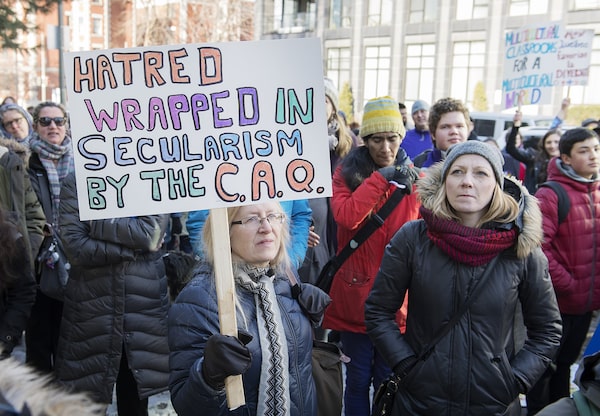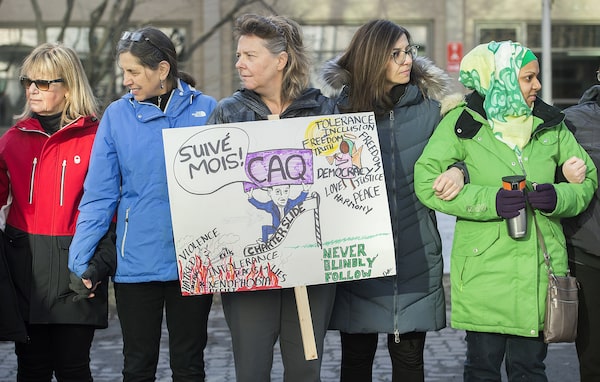
People hold up signs opposing the Quebec government's newly-tabled Bill 21 during a protest in Montreal on April 3, 2019.Graham Hughes/The Canadian Press
In a cold open for a 2017 episode of the ABC comedy Black-ish, protagonists Bow and Dre walk into a bakery to buy a gender-reveal cake. The bakery has every type of cake, the employee says – but not for gay weddings. Bow and Dre leave in disgust. At the next bakery, they cut to the chase: “You don’t discriminate against people based on race, gender or sexual orientation, do you?” To which the stern-looking baker replies: “Do not like French-Canadians.” Initially stunned by the random reply, Bow and Dre quickly indicate they can live with that, and proceed with the order.
What passed for laughs in America would never fly up here. But the mention of French-Canadians in juxtaposition with fundamental civil rights was downright prescient, if not ironic. In this fictitious TV show, everyone’s fundamental civil rights are worthy of protection – except if you’re French-Canadian.
The reverse is true in one major part of French Canada – and the Quebec government’s rhetoric and actions would be comedic, too, if they weren’t so tragic.
The Coalition Avenir Québec’s Bill 21 seeks “religious neutrality” – that is, legalizing employment discrimination based on an individual’s religious expression. Civil servants, along with judges, police officers, prison guards and teachers, will be forbidden from exhibiting any religious affiliation while on the job. According to Premier François Legault, observant Sikhs, Jews and Muslims should look for another line of employment. Where else in the world has an elected leader told constituents to find another job because of their beliefs?
Recently, a councillor in the Montreal borough of Anjou, Lynne Shand, expressed her outrage at being treated by a doctor wearing a hijab, posting on Facebook: “If it hadn’t been an emergency, I would have refused to be treated by her. I’m angry because it’s really the Islamification of our country."
While she later apologized, she clarified that she is against “visible” religious symbols, alluding to the proposed bill. It was irrelevant that the doctor’s service – according to Ms. Shand – was excellent.
This follows on the heels of similar outbursts by other Quebec politicians. CAQ Minister for the Status of Women Isabelle Charest unequivocally stated that the hijab is a sign of oppression, thereby proving that she is unfit to serve all women in her province. Gatineau deputy mayor Nathalie Lemieux resigned after telling a French-language newspaper that Muslim immigrants don’t integrate, adding they “do bad things with their trucks … it’s normal to be afraid of them.”
First and foremost, the dangerous bill creates two tiers of citizens: those with full rights and opportunities, and those without. Since it uses the Charter of Rights and Freedoms’s notwithstanding clause to preclude any court action, the bill invites civil disobedience as the only means to fight against laws that deny fundamental freedoms. Furthermore, the bill gives licence to xenophobes to stigmatize and berate fellow Quebeckers. While Public Security Minister Geneviève Guilbault has backtracked on her warning that police would enforce Bill 21, it harked back all the same to the federal Conservatives’ proposed “snitch line” in the 2015 election.
And while it may be civil servants and employees in positions of authority today, who will it be tomorrow? Doctors providing service? Students at public schools, as was the case in France? Will the private sector follow the government’s lead? Finally, what other encroachments will there be on religious freedoms? Will Muslim students be barred from fasting during Ramadan, as was proposed by certain Quebec schools in 1995?
Before the rest of Canada gets smug, it should reflect on its own attitudes. Georgetown University’s comprehensive study on Islam, Muslims and Islamophobia, compiling Canadian data between 2004 and 2018, paints a glum picture. While the majority of Canadians acknowledge that anti-Muslim sentiment is a growing problem, most hold unfavourable views about Islam and Muslims. For example, last year more Canadians were worried about “homegrown radical Islamic terrorism” than violence from white-supremacist groups. In 2017, roughly half of all Canadians believed that Islam is the most “damaging” religion in the public sphere – even after six people were killed in a Quebec City mosque.
Now that there’s been a legislative assault on religious freedoms, will Anglo-Canadians stand up, too?

Bill 21 has been met with active opposition in Quebec.Graham Hughes/The Canadian Press
In the days since Bill 21 was introduced, there has been active opposition to it within Quebec, giving the lie to Mr. Legault’s Orwellian promise that the bill would bring Quebeckers together. Quebec civil society’s actions are reminiscent of the inspiring acts of solidarity by New Zealanders in the wake of the attacks at two mosques in Christchurch.
The difference in political leadership between Quebec and New Zealand, however, is like night and day.
As Martin Luther King Jr. once said: “Nothing in all the world is more dangerous than sincere ignorance and conscientious stupidity.” Looking at Quebec today, where reality is stranger – and far more dangerous – than fiction, and where a government works to effectively sanitize bigotry against its own people, his words ring too true.
Editor’s note: (April 8, 2019) An earlier version of this story stated the Coalition Avenir Quebec government's proposed legislation prohibiting certain public employees "from wearing religious symbols in the exercise of their functions" is named Bill C-21. In fact, it is named Bill 21.